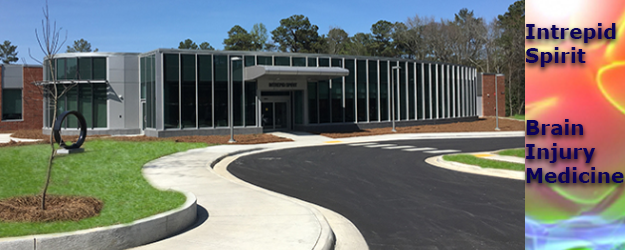Brain Injury Medicine - Intrepid Spirit

Traumatic Brain Injury (TBI)
After a concussion, service members will be evaluated by their Primary Care Manager (PCM) or provider. If they remain symptomatic after the acute stage of recovery (two weeks up to one month), they may benefit from evaluation and treatment at the Intrepid Spirit Center, Womack Army Medical Center. They should talk with their primary care manager if they are unsure about the symptoms they are experiencing.
All Soldiers who have received a referral from their PCM or provider may schedule an appointment at the Intrepid Spirit. Appointments are available Monday-Friday, 8:00 a.m. - 4:00 p.m. Currently the Intrepid Spirit is only able to provide services for service members. Retirees and beneficiaries are referred to a specialty provider off post.
Concussion Care Clinic
The Concussion Care Clinic (CCC), Department of Brain Injury Medicine, is responsible for the evaluation and treatment of patients who have sustained a concussion or traumatic brain injury (TBI). This includes management of patients with Persistent Post-Concussive Symptoms (PPCS). For patients with PPCS, providers perform a detailed history and physical examination in order to better identify the cause of each persistent symptom, and customize a treatment program. Clinicians within the CCC coordinate and supervise any rehabilitation services deemed necessary, and ultimately make recommendations regarding physical limitations and fitness for duty of active duty patients.
Multidisciplinary Team
The Intrepid Spirit Center utilizes a holistic, multidisciplinary approach to better determine the cause of Persistent Post Concussive Symptoms (PPCS). They provide comprehensive treatment for functional deficits associated with concussion/ traumatic brain injury. Team members meet regularly to discuss individualized patient goals and progress, making changes as needed to ensure maximum recovery.
Services Provided
- Neuro-Optometry directs vision rehab, which can improve symptoms - such as headaches, perceptual deficits, and balance - as well as service members' activities of daily living, such as shooting, reading, and routine Soldier tasks.
- Neuropsychologists evaluate through testing the nature and extent of impairment following TBI and plan strategies to compensate for the injury.
- Occupational therapists help service members who have sustained a TBI to develop, recover or maintain their ability to perform tasks of daily living.
- Physical therapists evaluate and treat vestibular and balance disorders commonly associated with head injury.
- Speech and language pathologists assist service members who have speech, language, and cognitive (attention, memory, problem solving) problems to regain optimal communication.
- Social workers/psychologists provide evaluation, education, supportive services, and referrals for soldiers and family members to decrease psychiatric distress and promote wellness strategies.
Return to Forces (RTF) Treatment Program
RTF is a comprehensive and intensive outpatient treatment program geared at treating persistent symptoms related to a traumatic brain injury, chronic pain, and associated comorbidities. Over the course of five weeks, service members are assessed and treated, not just traditionally but holistically, with the latest integrative and complementary techniques. Both individual treatment and peer cohort group care are custom tailored to the needs of each participant. Treatment plans will be customized with input provided by the patient and input from our multidisciplinary team.
Below are examples of available treatment modalities based on each service members individualized treatment plan. Additional complimentary integrative medicines such as acupuncture, chiropractic care, yoga and mindfulness are also potential areas of exploration.. It focuses on the power of the body to heal itself without the use of drugs or surgery., yoga and mindfulness are also potential areas of exploration. Adjunctive therapies such as equine assisted communication therapy and art therapy will also be explored over a four-week span.
- Neurology
- Physical Medicine/Rehabilitation
- Neuroimaging (MRI)
- Speech Language Pathology
- Physical Therapy / Vestibular Rehabilitation
- Laboratory Studies
- Neuro Optometry
- Mental Health / Pastoral Care
- Neuropsychological Assessment
- Complementary Integrative Medicine
- Advanced Specialty Care